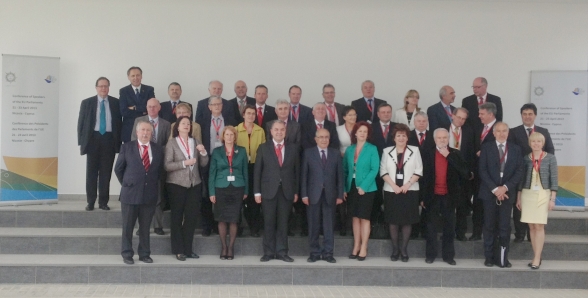President of the Parliament of Montenegro, Mr. Ranko Krivokapić, is participating at the Conference of the Presidents of Parliaments of the European Union Member States.
At the Conference which is being held in Nicosia, presidents of the parliaments are discussing the role of European parliaments in improving democracy and human rights in the Mediterranean region as well as the social cohesion in the period of crises. For the third time Montenegro is participating, as a candidate for membership to the EU, at the Conference of the Presidents of Parliaments of the European Union Member States.
President Krivokapić was one of the speakers on the topic of the role of the European and national parliaments in improving democracy and human rights in the third countries, especially regarding the Mediterranean region.
He said that the oldest democratic community in the world – Europe, had to have one vote regarding the support and unique approach in helping new democratic energy of the Arab world. With regard to that, he emphasized that it was not a chance only for the Arab Mediterranean, but also an opportunity for consolidating the global reputation of the European Union.
President Krivokapić stated that two decades ago in the Western Balkans populism and nationalism ousted one-party system. After that, as he said, the bloodiest war in the Europe region happened in the second half of the 20th century, even though the blooming of democracy was expected. He expressed his expectance that, contrary to that period, when European community, which was not sufficiently institutionally established back then and thus did not understand certain processes, would have and adequate and sustainable response today.
“European Union is much stronger today, so I believe that our parliaments will play a key role in full understanding of democratic needs of our Mediterranean friends. Parliaments are obliged to spread democratic values and help great democratic energy to be adequately channelled towards lofty ideals of democracy and human rights”, Krivokapić said.
The Conference was opened by the Chairman of the Cyprus Parliament, Mr. Yannakis Omir, who emphasized that many countries of the European Union passed through difficult period of crises, and that it was a great test for the European Union.
According to him, Cyprus is currently the most illustrative example of the country in crises, and regarding that he stated that Europe needed solidarity now more than ever. He said that solidarity was one of the basic foundations that the European Union was based on, and that the European Parliament should especially contribute to it.
During the Conference, the President Krivokapić had a series of bilateral meetings with presidents of parliaments of the EU Member States, including meetings with Mr. Vidas Gedvilas, the President of the Lithuanian Parliament which will be the next one to preside over the European Union, as well as Mr. Josip Leka, Speaker of the Croatian parliament, which will be the member of the European Union from the 1 July.
The competences of the European Union were discussed for the first time at this Conference, as well as competences of national parliaments in the context of measures which the European Union took with the aim of strengthening fiscal management within European and Monetary Union, which resulted in concluding the Treaty on Stability, Coordination and Governance in the European and Monetary Union.
Article 13 of the Treaty is especially important for the parliaments, stipulating greater competences for parliamentarians at national and European level in this field.
Through the framework of the inter-parliamentary conference, the parliamentarians get the opportunity for stronger participation in defining and implementing integrated and harmonized financial, budgetary and economic policies of the Member States of the European Union, the signatories of this Treaty.








